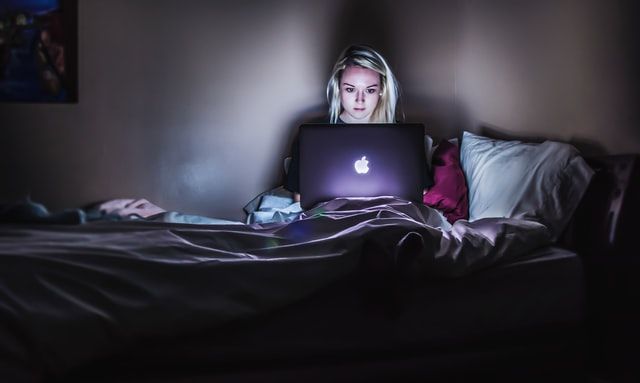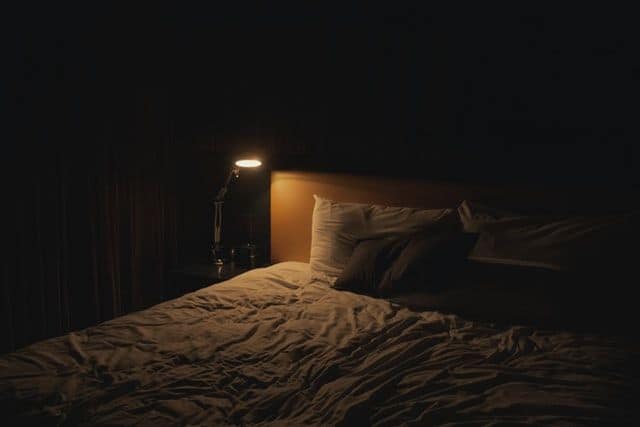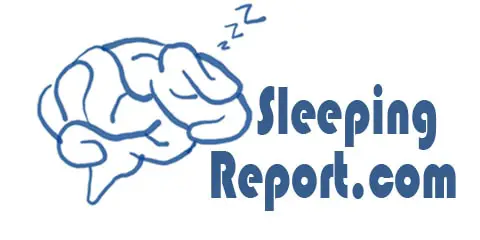Everyone is looking for a good night’s sleep. But they never consider that the time they actually go to sleep affects how good that night’s sleep will be.
So, is it harmful to sleep after 11 pm, 12 am, 1 am, or 2 am? Scientific research has determined that the answer is yes, it is harmful to sleep after 11 pm, 12 am, 1 am, or 2 am!
The purpose of this article is to provide information that explains why it is harmful to go to sleep after 11 pm, 12 am, 1 am, or 2 am, and what you can do to ensure a good night’s sleep. That answer will come as we explore these issues:
- The health effects of falling asleep after 11 pm, 12 am, 1 am, or 2 am
- The benefits of falling asleep before 11 pm
- How to fall asleep when you know you have to wake up early
- Is sleeping late but getting 8 hours of sleep okay?
- Tips for falling asleep quickly
The Health Effects Of Falling Asleep After 11 pm

We’ve all experienced the effects of a bad night’s sleep. We’re grumpy, and we can’t focus on work. But you may not be aware that a bad night’s sleep can result in several serious medical issues from obesity to diabetes. Moreover, it shortens your life expectancy.
As you live your day, you depend on the clock. You’re due to be at work by 9 am, so you strategize when you need to wake up, prepare for the day and then travel to work.
You figure that you should get up no later than 7 am so that you can do all the things you need to and still have time to drive or take a bus to work.
Well, while you’re acting according to a clock, your body is doing the same. But instead of following that clock on the wall or table, your body is acting upon your internal or “biological clock.”
Science calls that “biological clock” the suprachiasmatic nucleus (SCN). It’s an actual thing in your brain that resembles a pinecone that’s about the size of a grain of rice, and that hosts about 20,000 neurons.

As light enters your eyes, neurons in the retina activate and change that light into electrical signals. The signals travel through the optic nerve to your “biological clock,” and it stimulates many sections of the brain, including the pineal gland, which switches off the production of melatonin, so you feel wide awake.
Meanwhile, your “biological clock” is also managing your body temperature, hormone secretion, urine production, and variations in blood pressure.
At night the darkness triggers the “biological clock” to increase the melatonin, which makes you sleepy.
As you can see, your body reacts to the tempo of day and night. When you mess around with that tempo and go to bed after 11 pm, you’ve unleashed the possibility of serious health issues and have affected your level of sleep.
Sleep is a sequence of back and forth shifts between rapid eye movement (REM) sleep and non-REM sleep.
Your brain processes all the memories and thoughts of the day when you’re in REM sleep, and you dream. When you’re in non-REM sleep, the brain recuperates from its daily activities and releases hormones that assist the body to rejuvenate from the harm done during the day.
Once you fall asleep, you experience 90-minute cycles of non-REM and REM sleep. The proportions of non-REM-to-REM sleep during the 90-minute cycles vary through the night.
Early on (from 11 pm and 3 am), the majority of the cycles are deep non-REM sleep with little REM sleep. In the later part of the night (from 3 am to 7 am), there is more REM sleep with lighter forms of non-REM sleep.
If you sleep for 8 hours from 9 pm to 5 am, there is more non-REM sleep occurring than if you sleep from 3 am to 11 am when you are experiencing more REM sleep.
So, if you go to bed late, then you deprive yourself of some of the rejuvenating functions that occur during non-REM sleep.
Go to bed after midnight, and you mess with your body’s natural rhythms that the “biological clock” is managing resulting in insomnia. You will also have a more difficult time falling asleep as well as staying asleep.
And there’s more including anxiety, an inclination for reduced efficiency and productivity as well as accidents.
Some studies show that drivers who report less than seven hours of sleep, poor sleep quality, dissatisfaction with sleep duration, and daytime sleepiness experience more car accidents. According to the National Highway Traffic Safety Administration, drivers who are “drowsy” cause more than 100,000 traffic accidents a year in about 1,550 deaths.
In addition, there is an increased risk of cardiovascular problems for people who experience less sleep. For example, researchers studying nurses’ health found that women who slept for seven hours or less per night had more coronary events than women who averaged eight hours of sleep a night.
And, researchers have found that less sleep causes a shorter duration in the secretion of melatonin, which is associated to a greater risk of breast cancer. A study of more than 23,000 Japanese women discovered that women who slept six hours or less a night had a greater risk of breast cancer than women who slept seven hours a night.
Besides experiencing physical problems due to lack of sleep, you may also suffer mental health problems.
A study of about 28,000 high school students that was published in the Journal of Youth and Adolescence discovered that each hour of lost sleep could result in feelings of sadness or hopelessness and an increase in suicide attempts.
Thirty-eight percent of the students reported that they were sadder or felt hopeless, and 58 percent attempted suicide. Another study performed in 2010 found that teenagers who sleep an average of six hours a night are three times more likely to be depressed.
In addition, lack of sleep can make teens more susceptible to diabetes and obesity when they grow into adults. There is also an increase in dependency on sleep and anxiety medications.
The Benefits Of Falling Asleep Before 11 pm

Going to sleep early assures restoration of your body. For example, much more sleep restores the brain as well as body cells to such an extent that every one-hour of sleep you get before midnight is three times better than going to sleep after midnight. Going to bed early is good for your overall health.
Other benefits include:
- Waking up early the next morning is easier
- A better night’s sleep
- Worrying less
- Creating a more natural sleep pattern
- Getting you on a regular schedule
- Increasing the likely hood that you will lose weight
- Improving your circadian rhythm (or internal clock)
- Improving your immune system
- Making you less susceptible to diseases
Circadian rhythm assures that your body operates on a 24-hour cycle that includes sleep and wake. It alerts you when it’s time to go to bed and when it’s time to wake up.
How to fall asleep when you know you have to wake up early
All of us have experienced it at one time or another. You have to wake up earlier than usual so that you’re ready to attend an early appointment or you want a good night’s sleep so that you can wake up early to pick up a family member or friend at the airport.
There are many reasons why you might have to get up earlier than usual, but you want to ensure that you get a good night’s sleep.
Here is how to achieve it.
Go to bed earlier than usual to assure a good night’s sleep
If you commonly go to sleep at 11 pm, go to sleep at 10 pm. The goal is to wake up earlier easier.
Make yourself comfortable
The goal of assuring comfort starts with creating an environment that encourages sleep. You want your bedroom to be cool and dark so that your “biological clock” understands that it’s night and time to increase the production of melatonin to induce sleep.
To ensure comfort in bed, determine the best sleep position. Try out a number of different positions until you find the one that is most comfortable.
Lie still
Once you have found the most comfortable position, stay in it, and remain still. Shifting your body into different positions can disturb your body’s attempt to fall asleep. Focus on facing one direction to prevent the impulse to move.
Use meditation to clear your mind
Concentrate on your breath as you inhale and exhale. Feel your breath throughout your body, and focus on how your breath moves. Allow your breath to relax your muscles and focus on how your breath moves throughout your body.
Use breathing exercises to calm down.
One breathing exercise to try is called the 4-7-8 technique. Press your tongue onto the roof of your mouth behind your front teeth. Inhale through your nose as you count to four, and then hold your breath while you count to seven. Exhale through your mouth as you count to eight. Repeat the process four times.
Use a finger to close one nostril as you breathe through the other. This forces you to be aware of your breathing.
Inhale as you count to three, and then exhale as you count to six until you fall asleep.
Is sleeping late but getting 8 hours of sleep okay?
This article is owned by Sleeping Report and was first published on April 1, 2020
The European Society of Cardiology Congress has performed a recent study substantiating that six to eight hours of sleep is ideal, at least for one’s heart health.
Dr. Epameinondas Fountas of the Onassis Cardiac Surgery Centre in Athens, Greece used the analysis of 11 studies of more than one million adults with no sign of heart disease to ascertain the effect of sleep on the cardiovascular system.
People who slept for less than six hours a day, more than eight hours a day, and six to eight hours a day were studied. It was found that those who slept for less than six hours a day had an 11 percent greater risk of developing cardiovascular disease.
Those who slept more than eight hours a day had a 33 percent greater risk of developing cardiovascular disease. The study sets the sweet spot for getting a good night’s sleep at between six and eight hours.
So, is sleeping late but getting eight hours of sleep okay? Considering what occurs during sleep, the answer appears to be no.
As discussed earlier, sleep involves cycles of back and forth, shifting between REM sleep and non-REM sleep. When in REM sleep, the events and thoughts of the day are managed, and dreams occur.
During non-REM sleep, the body is going through a restoration process in which the brain regenerated from its daily activities, and hormones are excreted that assist in rejuvenating the body.
The cycles occur every 90 minutes and changes through the night regardless of when you go to sleep.
Between the hours of 11 pm and 3 am, the majority of the cycles include deep non-REM sleep and very little REM sleep. However, in the latter half of the night, from 3 am to 7 am, the cycles include more REM sleep and lighter moments of non-REM sleep than occurs earlier in the night.
A person who sleeps from 9 pm to 5 am will have more non-REM periods than someone who sleeps from 3 am to 11 am who experiences more periods of REM sleep.
So, going to bed late but getting eight hours of sleep is not okay.
Tips for falling asleep quickly

Everyone has experienced nights when it was impossible to fall asleep. Well, those nights my be over. Believe it or not, there are several methods you can use to fall asleep quickly.
How quickly? Would you believe in 10 seconds, 60 seconds, or 120 seconds?
Some preparation must be done before using these methods. Some you may already know, but some you may not. They include:
- Taking a warm shower before going to bed.
- Opening a window of your bedroom for cool, fresh air.
- Wearing socks.
- A 15-minute session of yoga
- Avoiding caffeine
- Aromatherapy including sniffing lavender, chamomile, or clary sage.
- Eating early to prevent stomach digestion or stimulation while trying to sleep.
Any of these, or a combination of some, will definitely put you in the mood to sleep.
This article is owned by Sleeping Report and was first published on April 1, 2020
Methods created to help you get to sleep quickly include:
- The military method
- Progressive muscle relaxation
- Reverse psychology
- Imagery distraction
- Image distraction
The Military Method
This method is based on a book titled: Relax and Win: Championship Performance. It describes a routine used by the United States Navy Pre-Flight School that was created to assist pilots in falling asleep in two minutes or less.
- Relax your face and mouth muscles.
- Drop your shoulders and let your hands fall to the side of your body.
- Relax your chest as you exhale.
- Relax your legs, thighs, and calves.
- Imagine a relaxing scene for 10 seconds.
- If 4 doesn’t work, say, “Don’t think” over and over again for 10 seconds.
If the method works right, you should fall asleep within 10 seconds.
Progressive Muscle Relaxation
Also called Deep Muscle Relaxation, this method is based on creating and releasing tension on your muscles. It is said that it results in a calmness throughout your entire body.
- Lift your eyebrows as high as you can for 5 seconds to tighten your forehead muscles.
- Relax your muscles quickly and feel the tension drop. Wait 10 seconds.
- Smile widely to establish tension in your cheeks, hold for 5 seconds, and then relax.
- Rest for 10 seconds.
- Squint your eyes shut, hold for 5 seconds, and then relax.
- Rest for 10 seconds.
- Tilt your head back a little, so you’re looking at the ceiling. Hold the position for 5 seconds, and relax as you allow your neck to sink into the pillow.
- Rest for 10 seconds.
- Tense and relax down the rest of your body from triceps to chest, thighs, and feet.
- Let yourself drift into sleep s you finish tensing and relaxing your body.
Reverse Psychology
Also referred to as paradoxical intention, keep telling yourself to stay awake.
Studies have shown that people who have used this method fell asleep faster than those who didn’t. It works especially well when you’re stressed out about trying to sleep.
Imagery Distraction
Use meditation to engage your imagination. Visualize a calm place that you’ve been to.
A study performed in 2002 at the University of Oxford discovered that people who used imagery distraction fell asleep faster than people who experienced general distraction.
Image Distraction
Imagine a waterfall, including the sounds of rushing water and echoes as well as the smell of moistened moss. The idea is to let this image crowd your brain and push out all other thoughts, worries, and concerns.
Summary
The key points of this article are:
SleepingReport.com copyright article was updated on ..
- There are health effects of going to sleep after 11 pm. There is an effect on the REM and non-REM cycles of sleep resulting in an inhibition of your body’s attempts to regenerate.
- There are benefits to going to sleep before 11 pm. The benefits run from a good mood to better health.
- There are methods you can use to fall asleep faster. The methods run the gambit from tense and relax to meditation and imagery.
- Getting 8 hours of sleep after going to bed later than 12 am does not relieve you of health problems. Effects on REM and non-REM sleep when going to bed late are not relieved if you sleep for the recommended 8 hours.
Scientific research has found that we need 6 to 8 hours of sleep and should go to bed before 11 pm to ensure good health.

